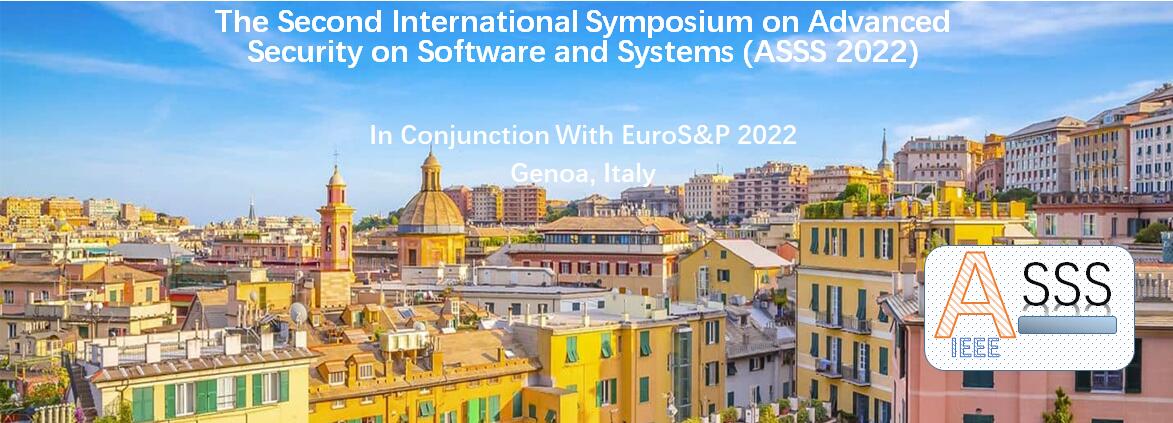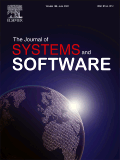The workshop will be fully online. The Zoom link is
here.
Program:
6 June 2022 (Local time in Genoa)
09:10 - 09:20am
Welcome
Workshop chairs
09:20 - 10:20am
Keynote 1 (Session Chair: Weizhi Meng):
Title: The Evolution of Android Packing and Unpacking Techniques
Abstract: Nowadays, the Android packing techniques have be widely applied to preventing Apps from being repackaged or reverse-engineered. Meanwhile, the prevalent usage of packing techniques also improve the difficulties of Android malware detection because the malicious authors are also exploiting them to protect the malicious Apps from analysis. Although various unpacking solutions have been proposed to assist in the analysis of packed Apps, the packing techniques are evolving frequently, which require new unpacking solutions. The speaker will introduce the evolution of the common Android packing techniques as well as their characteristics. Also, in this talk, the existing popular unpacking techniques and their evolution process will be introduced.
-
Lei Xue, The Hong Kong Polytechnic University, China
Bio: Lei Xue is a research assistant professor in the Department of Computing at The Hong Kong Polytechnic University. He also earned the Ph.D. degree in Computer Science from The Hong Kong Polytechnic University (PolyU). He is widely interested in designing and implementing efficient and practical security systems, with a particular focus on applying program analysis methodology to addressing the challenging security issues and detecting vulnerabilities in mobile and network systems. He has published several papers in top conferences including USENIX Security, ICSE, and INFOCOM, and high-impact journals like TIFS and TSE. He also served as a reviewer for many conferences and journals, such as TIFS, TDSC, TSE, and TMC. Currently, his research topics include mobile system security, IoT security, and telematics security.
10:20 - 10:45am
Paper Session (Session Chair: Jacques Klein):
- Blockchain and Federated Learning-enabled Distributed Secure and Privacy-preserving Computing Architecture for IoT Network
Pradip Sharma, Prosanta Gope, Deepak Puthal
10.45-11.15am
Coffe Break
11:15 - 12:15pm
Keynote 2 (Session Chair: Li Li):
Title: Facilitating the Removal of Kernel Vulnerability with Crash Triage
Abstract: Nowadays, kernel fuzzing projects like Syzkaller and Syzbot, have significantly expedited the discovery of vulnerabilities in the Linux kernel, finding more kernel vulnerabilities than those found in the past 20 years. However, state-of-art fuzzing projects suffer from several drawbacks. First, it generates a sheer volume of crash reports, many of which are "duplicated" reports caused by the same bug. While Syzbot uses a simple heuristic to deduplicate crash reports, we find that it is often inaccurate and cannot group many duplicate reports. Second, not all bugs need immediate patching, it usually depends on the severity of kernel vulnerabilities. Security Analysts usually use the manifested error behaviors to infer the exploitability of a vulnerability and prioritize the patching of the corresponding kernel vulnerability. However, only with the error behaviors in the reports, security researchers might underestimate the severity of one vulnerability. In this talk, I will introduce my recent research works on kernel crash triage to facilitate the removal of kernel vulnerabilities. More specifically, I leveraged empirical study and directed fuzzing to develop systems that automatically triage crash reports generated by kernel fuzzers.
-
Dongliang Mu, Huazhong University of Science and Technology, China
Dongliang Mu is currently an associate professor in the School of Cyber Science and Engineering at Huazhong University of Science and Technology (HUST). He earned his Ph.D. in Computer Science from Nanjing University and fortunately was supervised by Bing Mao. During his Ph.D. career, he acted as a research assistant of Professor Xinyu Xing at Pennsylvania State University. His research focuses on Software and System Security. More specifically, his research interests span the areas of Vulnerability Fuzzing, Vulnerability Analysis (including Crash Deduplication, Crash Diagnosis, Vulnerability Reproduction), and Vulnerability Assessment. His recent projects focus on Linux Kernel Security, including crash deduplication, severity assessment, and patch quality assurance. His research work is recognized for its highly practical impacts. His works have been published at top-tier conferences, including IEEE S&P, Usenix Security, CCS, NDSS, ASE, and TSE. In 2018, he is a recipient of ACM CCS Outstanding Paper Award (2018). His past research has been covered by many medium, such as ChinaDaily, Tencent, Sohu, and CSDN. He was also the organizer of NSA memory corruption forensics competition.
12:15 - 12:40pm
Paper Session (Session Chair: Li Li):
- GNPassGAN: Improved Generative Adversarial Networks For Trawling Offline Password Guessing
Fangyi Yu, Miguel Martin



